Marvel NOW‘s rebooting of the iconic Ms Marvel title caused controversy ever since it was announced last November.
Why? Because the new character is a teenage girl of Islamic faith; and the heated reaction that ensued illustrates just how culturally, socially (or even racially) sensitive a time we still live in in 2014.
It has proven to be the most ‘controversial’ element of the ongoing Marvel NOW reorganisation of the Marvel Universe.
Not to be confused with the better-known, classic Ms Marvel, aka Carol Danvers, who is presently incarnated in Marvel NOW’s new order of things as ‘Captain Marvel’ in Kelly Sue DeConnick‘s ongoing series, the new Ms Marvel title features brand new character Kamala Khan, the daughter of Pakistani immigrants living in New Jersey.
Ms Marvel #1, from writer G. Willow Wilson and artist Adrian Alphona, gives us the first Muslim character to have their own solo series, and also the only person of color presently with their own title, this being amid a concerted increase in female-led Marvel titles after years of the organisation being criticised for its depiction of female characters.
As described by Wilson and series editor Sana Amanat, the new Ms Marvel balances her hero job-spec of battling super villains and coming to terms with her new powers against the pressures of her highly conservative family background and her search for her personal identity in her American life. The reason she takes the name Ms. Marvel is on account of her longstanding admiration of Danvers.
“Captain Marvel represents an ideal that Kamala pines for,” Ms. Wilson recently told NYT. “She’s strong, beautiful and doesn’t have any of the baggage of being Pakistani and ‘different.’”
Wilson added that the new Ms. Marvel is “about the universal experience of all American teenagers, feeling isolated and finding what they are”.
Ms Marvel – the traditional Carol Danvers version, that is – remains one of my all-time favorite comic characters. When I first came across the news of the new reboot last November, I was vaguely sceptical, not at the idea of a Muslim girl adopting the Ms Marvel name; but I wondered if this was somewhat a contrived gesture of ‘inclusivity’ or cultural diversity for the sake of it at best, or at worst a ploy to provoke attention and debate.
My impression now that I’ve read the first two issues is that this wasn’t the case at all. For the record, I really liked these opening stories: and I’ve warmed to Kamala Khan very quickly and easily.
The latter – the attention and broad span of comment provoked – has been achieved; but there appears to be nothing cynical or tokenistic about G. Willow Wilson’s new character and set-up.
Though I should be forgiven for wondering about that at first, given that Marvel has used its platform for preaching before; for example, Stan Lee‘s anti-drugs issues of The Amazing Spiderman being written at the behest of the Nixon administration.
Marvel has often broken ground in its comic books, whether it was introducing prominent black characters back in the seventies (X-Men‘s Storm, and the Black Panther before that, among others) or dealing with the AIDS virus via the mutant ‘Legacy Virus’ in the pages of X-Men comics, to name two examples, so the idea of a Kamala Khan type character isn’t necessarily as surprising as it was being made out in some quarters.
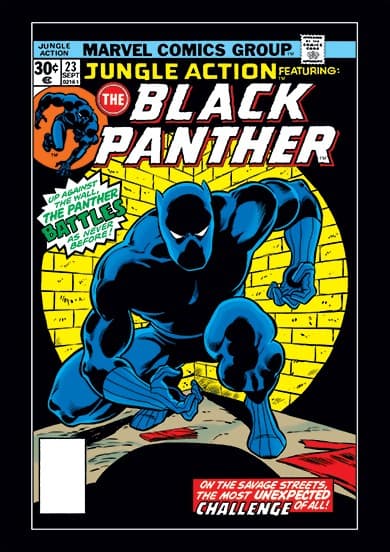
There was a time – very long ago – when black characters in mainstream comic books were a taboo. And there was almost certainly resistance from certain quarters to the Black Panther, one of the finest creations in the Marvel Universe, who first appeared in the Fantastic Four in 1966, with Captain America’s chum Falcon appearing in 1969 and Luke Cage three years after that.
Though admittedly in some instances the inclusion of black or ‘minority’ characters in relation to major titles has seemed somewhat tokenistic, often short-lived, such as brief phases in the Green Lantern world or Monica Rambeau briefly bearing as Captain Marvel (I know – the various incarnations or permutations of characters bearing the Ms Marvel or Captain Marvel name can get confusing; but yes, the “Captain Marvel” name currently held by former Ms Marvel Carol Danvers was once held by a now largely-forgotten female African-American character).
Much later we’ve also gradually seen openly gay characters emerge in mainstream comics, which again is something that would’ve been largely taboo not so long ago; Northstar, Karma, Graymalkin, the original Green Lantern (sort of retrospectively ‘outed’ as of 2012), and the kiss between Shatterstar and Rictor in Peter David‘s X-Factor, while DC‘s Batwoman/Kate Kane is the first openly gay character to have their own ongoing title. Last year Marvel Comics also hosted the marriage ceremony of Northstar and his civilian boyfriend Kyle in Astonishing X-Men #51, a fairly groundbreaking moment of the first same-sex superhero wedding in Marvel history; a graphic novel, Astonishing X-Men: Northstar has been released dealing with the matter and the events leading to it.
The X-Men world in general has long been regarded as highly allegorical of minority community struggles, particularly the gay community; which makes the recent Northstar/Kyle nuptials an eventuality fairly in-keeping with X-Men themes.
Stan Lee has actually often cited the African-American Civil Rights movement as an inspiration of the X-Men world, with many of the issues of majority-versus-minority racial politics being allegorized in the pages of X-Men titles over the years.
When Kamala Khan says in the new Ms Marvel #1, “I can never be one of them, no matter how hard I try…” she very much sounds like she could’ve been voicing such a sentiment in the pages of an X-Men title twenty years ago.
The point being that Marvel Comics has had a long tradition of dealing the real-world issues and cultural sensitivities of the time, everything from Captain America punching Adolf Hitler in the face to the Cold War, the Civil Rights Movement, and post-9/11 issues. It hasn’t always done it very well, but that’s a separate issue.
Unsurprisingly there was fair amount of guarded or even outright displeased response to the idea in the weeks and months leading up to the new title’s premier earlier this month, but all of this being before anyone had seen the comic. This was of course to be expected, given the highly culturally-sensitive or even culturally toxic time we live in. Anti Islamic feeling in much of the US made this inevitable; and a niggling undercurrent of mistrust in much of American society of Muslim ‘ideas’ and influence threatening traditional or ‘wholesome’ American values (whatever that means) has manifested in various areas of life and media in the years since 9/11.
It is therefore no surprise certain people or sections of the on-line community would be vocal in its disapproval.
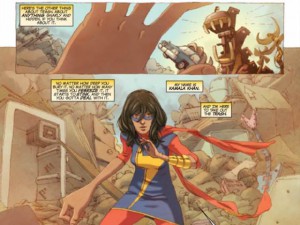
The fact is, however, most of those who tend to object to such things tend to be people who don’t really read comics or know a great deal about Ms Marvel, Carol Danvers or otherwise.
This point was reinforced by writer G. Willow Wilson, who recently told WIRED magazine, “There’s been some hate from people who don’t read comics, which I ignore because in terms of this medium, they are illiterate. There’s this sense that [Muslims] shouldn’t even be there because it’s somehow un-American.”
This outside perception of what comics are ‘supposed’ to be about is largely a hang-up of people who extraordinarily assume some kind of ‘ownership’ of popular characters or mythologies within comics while largely never having actually read those comics (I mean, clearly no one with those kinds of views could’ve ever read any X-Men comics, for one thing).
The notion of comic-book heroes being some kind of wholesome, patriotic, ‘All-American’ ideal is woefully outdated; if it ever even did apply, you’d have to be going back a few decades at least to find a time when that sort of perception of what Marvel comics – and comics in general – was about might’ve been valid.
Even Captain America, mistakenly thought by many non-readers to represent some kind of macho, wholesome American ideal, is actually entirely a liberal.
And the overwhelming majority of comics writers are liberals with forward-thinking minds that are more often than not reflected in the characters they write.
One thing I do understand and relate to is a sort of ownership or protectiveness that some fans and comic-book readers have over particular titles or characters that they’re loyal to; that’s an entirely different thing, however. There’s a difference between, say, getting agitated over a ret-conning or retooling of a character or story-arc or annoyed about a film adaptation ruining a comic-book character, and being angry about specifically the race or religious-background of a new character. Most people weren’t complaining about anything other than the race/religious connotation, as the integrity or nature of the previous Ms Marvel, Carol Danvers, wasn’t being impacted in the slightest by this new Ms Marvel title.
Some have pointed out that the negative public reaction isn’t dissimilar to when Miles Morales was announced as the new Ultimate Spiderman; that example has proven to be relatively successful over time and no one seems bothered by it anymore. Similarly DC experienced backlash when it introduced the Muslim Green Lantern, Simon Baz, in 2012. That too, however, has found a loyal fan base.
Comics and Marvel Comics in particular have been a target for right-wing nutjobs in other instances too. Right-Wing American website The Astute Bloggers have vigorously attacked DC and Batman for a story in which Batman goes to France to recruit an Islamic character named Nightrunner. Other ‘contentious’ areas to be attacked include Marvel’s Black Panther series, condemned for its sympathetic attitude towards independent South Africa, while elsewhere an issue of Captain America was recently slated by Right-Wing American group Council of Conservative Citizens for making fun of America’s Tea Party.
You can be certain that those protesting such things have no sense of any of the nuances or context of the issues they’re protesting.
You can also be certain they’re the same sort of people who permanently neglect to understand that the United States of America was founded by immigrants fleeing religious persecution, people who wanted a new life. It’s as if such people are under the false impression that only patriotic white guys read comic-books and that anything within the pages of mainstream comic books that doesn’t cater to the world-view of such patriotic, wholesome white guys is some kind of outrage.
Ironically, the specific type of patriotic white guys we’re talking about here are generally not the literate type and are highly unlikely to have read many comics or to have gotten many of the nuances if they had.
They may have no notion of how many people, especially young people, from minority communities and not just in America but all over the world, are loyal, dedicated comic-book readers.
So much so, in fact, that I’d argue that such readers shouldn’t even be considered a ‘minority’ to be pandered to, but actually the majority audience of numerous comic-book franchises.
Just as many would’ve been unaware not too long ago of how many young gay readers or young people struggling with issues of sexuality were a significant part of comic-book fandom and in many cases were taking solace from certain comic characters or stories, particularly in X-Men books (in fact, Bryan Singer, when trying to convince Sir Ian McKellin to play Magneto in first X-Men film, allegedly sold the character to McKellin as a sort of gay rights extremist).
You can find numerous moving testimonies too to how the presence of black characters like the Black Panther in mainstream comic books in the late sixties and early seventies really meant something to young black teenagers and readers at the time, who may have had other characters they liked, but none they could relate to.
No doubt there are Muslim readers of comic books – I know a few myself – including girls, who might take something very personal, very encouraging in the presence of a Kamala Khan type character having her own solo series and in whatever stories and ideas that series might go on to explore.
Relatability is a big deal; in comics, just as in novels or films.
And for a community – and Muslim females are a subset even within that broader minority – that is currently so controversially regarded and so unfavorably portrayed in mainstream media and largely ostracized from mainstream popular culture not just in the US, but elsewhere too, something like this is a fairly big deal.

This has been borne out by the fact that news of the new Ms Marvel title has been covered not just in mainstream US newspapers and websites, but in international papers too, including Muslim affairs publications.
It has, for that matter, also been borne out already in the letters sections of the new title, including some from young female readers with Islamic backgrounds.
Beyond that there’s also, I believe, a potential positive effect to be had in the longer-term with the presence of characters such as Kamala Khan, which is to inform or expose other young people who aren’t Muslims to some of the life-issues of someone like Khan, possibly creating more of a relatability, more of a humanizing of elements of a minority community that they may generally have little or no interaction with or understanding of.
I’m not saying for a moment that this is what the writers and creators of this new title are trying to do; I’m simply suggesting it could be one positive effect over time.
In fact, it might be this very thing that those outspoken naysayers are afraid of.
Again, I’m sure there were people with similar attitudes towards the Black Panther in 1966. And just as Kate Kane’s Batwoman has become DC’s most potent gay character, it’s possible Khan’s Ms Marvel could be Marvel’s most potent character of Muslim-roots in years to come.
Of course, Kamala Khan isn’t Marvel’s first Islamic character, nor its first Islamic female. Two examples from the X-Men universe immediately come to mind. Monet St. Croix, the mutant who first appeared in the X-Men’s Phalanx Covenant crossover in 1994 and subsequently in the fantastic Generation-X series in the mid-90s, represents a rare example of a Muslim superhero in American comic books. Her presence in the Marvel Universe has in fact previously been used to explore Islamophobic attitudes in the US, specifically in Peter David’s X-Factor series, which also used its pages to deal with ‘Ground-Zero Mosque’-type protests in the US.
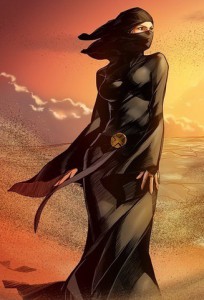
Again, the X-Men world in particular has always been a platform for allegorizing social issues of prejudice, at any rate.
Dust (Sooraya Qadir) has been another female Muslim character in the X-Men world. First appearing in December 2002 – a mere year after 9/11 – the character was shown experiencing difficulty adapting to her new surroundings. Dust was no tokenistic or watered-down character either, but was shown to stand by her faith, to wear full traditional abaya and niqab and to argue and defend her faith and her dress against those who among her friends who believe it to be an affront to women’s rights.
So Marvel – or X-Men, at least – has form in this department already.
The consensus so far is that the new Ms Marvel title is well-written, savvy and relatable, avoiding coming across as gratuitous or perfunctory.
I doubt it will attain the mythology status of the original Ms Marvel (but that’s a broader, more general issue in comics today in relation to comics twenty or thirty years ago), but I also doubt that it is trying to; rather it is more grounded in the real world and speaking to contemporary real-world issues of the post-9/11 generation.
There appears to be an authenticity to the Kamala Khan character and I’m sure there will be the same authenticity and integrity to the series as it develops. This was my overriding impression of the first two issues; I wasn’t blown away by anything or transported into some fascinating fictional world like I might’ve been in the past with some of my favorite comics. Rather it felt more like something grounded in modern life, albeit seen through the eyes and mind of a young woman with fantastical thoughts and an obsession with the Avengers.
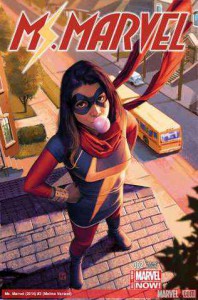
Away from on-line naysayers, Ms. Marvel #1 has received almost blanket critical acclaim from web reviewers and popular comic-book sites to broadsheet newspapers and more ‘high-end’ commentators.
The CBR site gave it 5 stars. And issue 1 is listed as Marvel’s digital best seller, outselling the most recent issues of New Avengers, All-New X-Men and the new Wolverine #1. All the publicity and debate has obviously done it a great service.
So Ms Marvel #1 has been both commercially and critically a resounding success. And on a purely cultural level, I’m very glad this has been the case, as it’s refreshing to see not just acceptance, but enthusiasm and goodwill towards it. Now that this first point has been passed, it’s unlikely the title will be garnering the same comment and debate a year from now, and it’s also unlikely it will continue to outsell bigger Marvel titles, but that doesn’t really matter.
If it can secure its own loyal readership or fanbase, it will have met its goal.
And actually if it ceases to be a talking point for the character’s cultural background and identity and the nature of comment merely reverts to the norm of comic-book discourse, then all the better.

Meanwhile the future of Carol Danvers remains safe in the hands of her tried-and-tested story-master Kelly Sue DeConnick; and that Captain Marvel series is superb: one of my favorite books in recent years. About Khan’s relationship with Danvers, Wilson has said, “She really idolizes Carol; [Ms Marvel] is an ideal she looks up to. So it makes sense for her to take that younger Captain Marvel role up.”
Of course it does.
At this point, it’s worth quoting the original Ms Marvel writer Gerry Conway, writing in his introduction to the 1970s series that Ms Marvel readers would see a parallel between “her quest for identity and the modern woman’s quest for raised consciousness, self-liberation and for identity”.
That was written almost forty years ago in regard to the original Carol Danvers; but it sounds an awful lot like it could apply very much to the young Pakistani immigrant introduced into the Ms Marvel title this month, doesn’t it?
And how fitting.


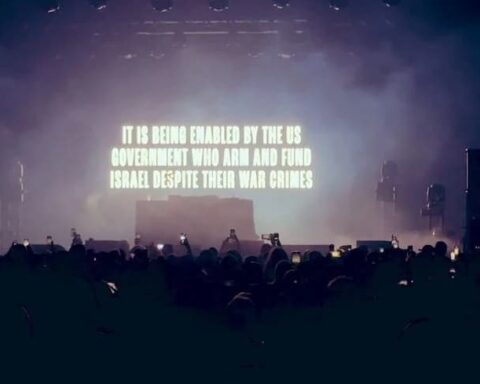


Kamala has transcended to a place few other comic book characters ever do. I have never seen, in such a short time, a character cement herself into marvels history quite like kamala. I, like everyone else, was worried this was a publicity stunt. But after a few issues, it becomes clear that this is something way more important than we could ever imagine. Thanks to G. Willow and Alphona, the world does not simply have a fantastic new Muslim character….. the world has another HERO that will one day stand next to cap, spidey, and Carol herself. And one day people won’t need to point out that she is Muslim, because it won’t matter her religion, what will matter is that Kamala is one of the most influential heroes out there.
That’s a great observation/sentiment, Jon; thanks. I agree that she’s developed extraordinarily quickly and will eventually completely outgrow the racial/religious perceptions people have. I really can’t praise Marvel enough for giving her a solo title.
Wow, I didn’t know about “Dust”, nor a version of a black Spiderman. With Dust, you sort of already addressed my first thoughts which were wondering whether this new Ms Marvel was merely a character of Islamic background or an actual “practising” Muslim girl. To be more specific, to count as a “Christian” simply agree to the theist doctrine that Christ is your saviour, follow some commandments and for the most part your good. Whereas, to be a practising Muslim (not one of mere origin), if we’re talking classification, you’ve got to at least pray 5 times a day and throughout the year undergo fasting on occasion (so I’m told). Clearly a lot more “practice” actually done in the latter religion than the former.
So basically, my initial fear was, “is this a token” background story, for the sake of controversy. According to this article, and your account on it being a financial and literary (if im allowed to say such a thing) success, I’ll assume it isn’t.
I’ll have to get my hands on a few issues and find out for myself.
Your opening paragraph… couldn’t help but think http://gfycat.com/JaggedGloomyBluewhale
(sorry) 😀
I’m scrolling back up to read the rest, now.
“As you were”.